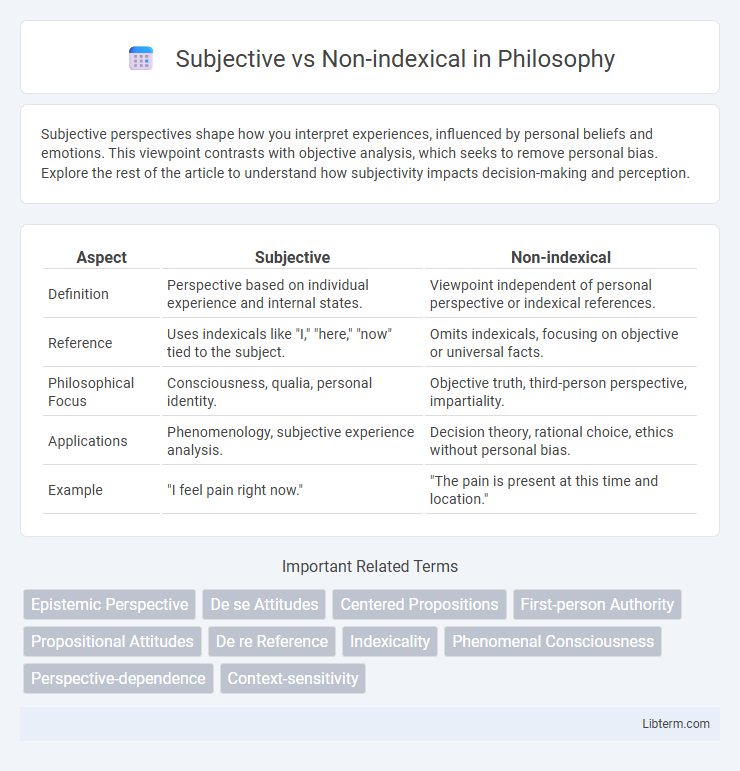Subjective perspectives shape how you interpret experiences, influenced by personal beliefs and emotions. This viewpoint contrasts with objective analysis, which seeks to remove personal bias. Explore the rest of the article to understand how subjectivity impacts decision-making and perception.
Table of Comparison
| Aspect | Subjective | Non-indexical |
|---|---|---|
| Definition | Perspective based on individual experience and internal states. | Viewpoint independent of personal perspective or indexical references. |
| Reference | Uses indexicals like "I," "here," "now" tied to the subject. | Omits indexicals, focusing on objective or universal facts. |
| Philosophical Focus | Consciousness, qualia, personal identity. | Objective truth, third-person perspective, impartiality. |
| Applications | Phenomenology, subjective experience analysis. | Decision theory, rational choice, ethics without personal bias. |
| Example | "I feel pain right now." | "The pain is present at this time and location." |
Understanding Subjective Reference
Understanding subjective reference involves recognizing perspectives tied to individual experiences and mental states rather than objective facts. Subjective reference pertains to expressions reflecting personal viewpoints or emotions, whereas non-indexical contexts refer to statements whose truth values remain constant regardless of the speaker's identity or context. Analyzing subjective versus non-indexical language aids in distinguishing how meaning varies between personal interpretation and universally applicable assertions.
Defining Non-Indexical Expressions
Non-indexical expressions refer to linguistic elements whose truth conditions remain constant regardless of the speaker, time, or context, contrasting with subjective or indexical expressions that shift meaning based on perspective. Defining non-indexical expressions involves identifying terms like proper names and definite descriptions that denote the same referent universally, ensuring semantic stability across contexts. This distinction is crucial in semantics and philosophy of language for analyzing meaning independent of speaker-relative factors.
Key Differences: Subjective vs Non-Indexical
Subjective statements express personal perspectives, emotions, or attitudes, relying heavily on the speaker's viewpoint and often including indexical elements like "I" or "here." Non-indexical expressions convey objective facts independent of the speaker's context, lacking deictic references and maintaining consistent truth conditions regardless of who utters them. The key difference lies in subjectivity influencing meaning in subjective statements versus the stable, context-independent reference of non-indexical expressions.
Role of Perspective in Subjectivity
Subjectivity fundamentally depends on perspective, as it shapes individual experiences and interpretations of reality, often leading to varied personal judgments and feelings. In contrast, non-indexical expressions remain constant in meaning regardless of the speaker's viewpoint, providing objective or universal information. The role of perspective in subjectivity highlights how personal context influences linguistic and cognitive frameworks, differentiating subjective states from non-indexical facts.
Types of Non-Indexical Language
Non-indexical language includes expressions whose reference or truth conditions do not depend on the speaker's identity, time, or location, distinguishing it from subjective language tied to personal perspective. Types of non-indexical language encompass descriptive terms, universally quantified statements, and generic generalizations, which convey information objectively regardless of context. This contrast highlights the role of non-indexical phrases in conveying stable, context-independent meanings essential for formal semantics and logical analysis.
Semantic Implications of Subjectivity
Subjectivity in language reveals how speakers' perspectives influence meaning, contrasting with non-indexical expressions that remain constant regardless of context. Subjective statements hinge on the speaker's attitudes, beliefs, or feelings, affecting truth conditions and interpretative frameworks. This semantic distinction impacts pragmatics and discourse analysis by highlighting how personal viewpoints shape communication and understanding.
Non-Indexicality in Linguistic Analysis
Non-indexicality in linguistic analysis refers to expressions whose meaning remains constant regardless of context, contrasting with subjective or indexical terms that vary based on speaker or situation. Non-indexical elements enable clear communication by providing objective reference points, essential for precise semantic interpretation and truth-conditional analysis. Understanding non-indexicality aids in distinguishing invariant linguistic content from context-dependent nuances in pragmatics and semantics.
Practical Examples in Everyday Language
Subjective statements express personal perspectives or feelings, such as "I feel cold," which depend on the speaker's internal state and vary from person to person. Non-indexical statements convey objective facts without reference to the speaker, like "Water boils at 100 degrees Celsius," which remain consistent regardless of who states them. Understanding the distinction helps clarify communication, as subjective language relates to individual experience while non-indexical language conveys universally verifiable information.
Philosophical Perspectives on Indexicality
Subjective perspectives in philosophy emphasize the speaker's point of view, often involving indexicals like "I" or "here" that directly refer to the context of utterance, shaping meaning based on individual experience. Non-indexical theories argue for objective content in statements, suggesting that meaning remains constant regardless of who utters them or when, focusing on propositional content without contextual shifts. Philosophers such as David Kaplan and John Perry have extensively analyzed indexicality, highlighting the tension between subjective contexts and non-indexical semantic content in understanding linguistic meaning and reference.
Impacts on Communication and Interpretation
Subjective language relies on personal perspectives, emotions, and opinions, shaping communication by introducing ambiguity and variability in interpretation. Non-indexical expressions maintain consistent meaning regardless of context, enhancing clarity and reducing misunderstandings in communication. Understanding the distinction between subjective and non-indexical language is crucial for effective interpretation and precise information exchange across diverse audiences.
Subjective Infographic

 libterm.com
libterm.com